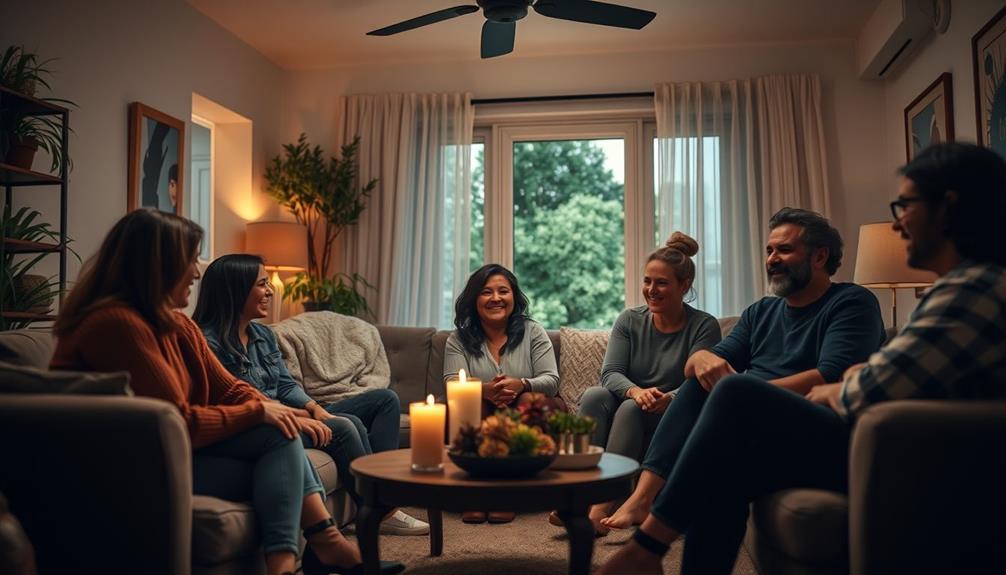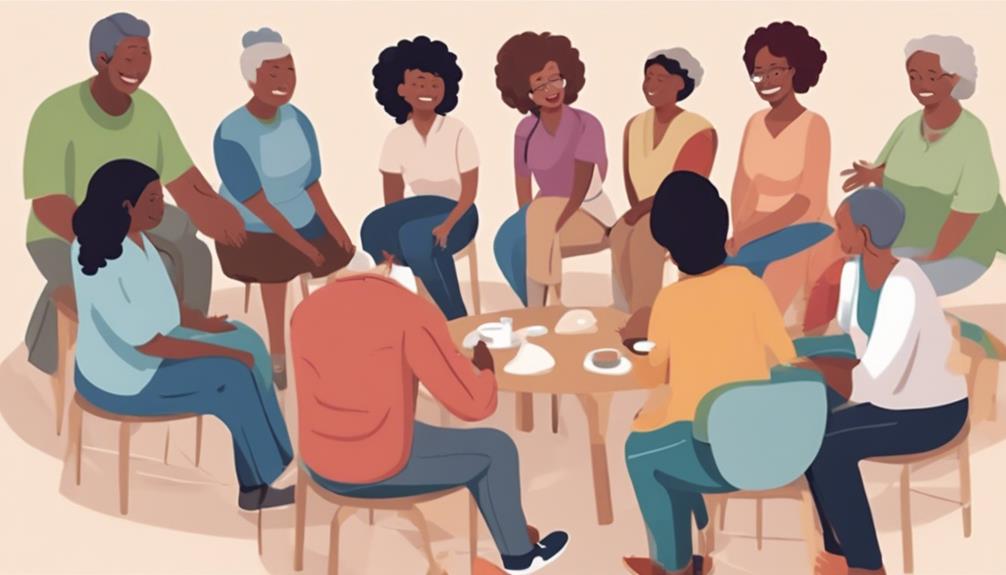Living with Parkinson’s disease can be daunting, but finding inspiration from Nick Nolte’s journey is beneficial. His lifestyle adjustments, such as regular exercise and a healthy diet, can help alleviate symptoms and promote overall well-being. Building strong family connections is essential for emotional and practical assistance. Sharing experiences and connecting with loved ones can cultivate resilience. Nolte’s narrative underscores the importance of maintaining a positive perspective and staying involved in life. These lessons demonstrate how hope can navigate you through tough times. Learn how these insights can transform your perception of living with Parkinson’s and more. Additionally, incorporating mindfulness practices like meditation can enhance mental health and reduce symptoms. Harrison Ford’s Parkinson’s diagnosis has underscored the significance of early detection and proactive management, urging others to seek medical guidance as soon as possible. These experiences remind us that with determination, a supportive community, and a focus on physical and mental wellness, living a fulfilling life with Parkinson’s is reachable.
Key Takeaways
- Regular aerobic workouts improve physical fitness and combat aging effects, essential for managing Parkinson's symptoms.
- A balanced diet and plant-based meals promote overall health and wellness, supporting those living with Parkinson's.
- Strong family connections and intergenerational bonds provide emotional and practical support, enhancing resilience during health challenges.
- Engaging in storytelling fosters understanding and empathy within communities, helping to break the stigma surrounding Parkinson's disease.
- Maintaining a positive outlook and seeking creative pursuits can offer purpose and fulfillment while navigating life with Parkinson's.
Understanding Parkinson's Disease

Parkinson's disease, a complex neurological condition, primarily disrupts movement and can greatly impact daily life. This progressive neurological disorder affects around 1 million people in the United States and about 10 million globally. You may notice symptoms like tremors, stiffness, and difficulty with balance and coordination as the disease progresses.
The underlying issue involves the degeneration of dopamine-producing neurons in your brain, which leads to a deficiency of dopamine—a neurotransmitter essential for regulating movement. Understanding your financial situation is also vital during this journey, as creating a personal budget can help manage healthcare costs and other expenses related to the condition.
While the exact cause of Parkinson's isn't fully understood, factors such as genetics, environmental toxins, and age likely contribute to its development. Understanding these elements can help you navigate the challenges this disorder presents.
Management of Parkinson's disease typically includes a combination of medication, physical therapy, and lifestyle changes tailored to your needs. Ongoing research aims to improve treatment outcomes and overall quality of life for those affected. Management of Parkinson’s disease typically includes a combination of medication, physical therapy, and lifestyle changes tailored to your needs. Ongoing research aims to improve treatment outcomes and overall quality of life for those affected. Additionally, addressing challenges such as managing Parkinson’s medication side effects plays a crucial role in ensuring the treatment plan remains effective and sustainable. Complementary therapies like mindfulness, speech therapy, and specialized exercise regimens may also provide added benefits in alleviating symptoms and enhancing daily functioning.
Staying informed about the latest advancements in Parkinson's disease management empowers you to make proactive decisions regarding your health and well-being. Embracing support systems and engaging with healthcare professionals can further enhance your journey with this neurological disorder.
Nick Nolte's Personal Reflections

Managing health challenges can be intimidating, but Nick Nolte's personal reflections offer a glimpse into resilience and determination. He faces ongoing struggles, including the speculation around Parkinson's disease, yet he approaches life with hope and a commitment to wellness.
Nolte emphasizes that maintaining a healthy lifestyle is fundamental, which aligns with the importance of financial considerations for elderly care to support overall well-being. Here are three key aspects he highlights:
- Physical Fitness: Engaging in regular aerobic workouts keeps him active and energized, combating some effects of aging and health challenges.
- Nutritional Choices: A balanced diet plays a significant role in managing his well-being, allowing him to fuel his body properly.
- Eliminating Harmful Habits: By quitting smoking and drinking, Nolte takes significant steps toward improving his health, showing that change is possible.
Family support is essential for Nolte. His children help him navigate daily activities and provide companionship, reinforcing the importance of connection during tough times.
Ultimately, Nolte believes that aging is a challenge worth tackling, and with perseverance, you too can find ways to embrace health and hope in the face of adversity.
Importance of Support Networks

Support networks play an essential role in traversing health challenges, offering the emotional and practical assistance needed to maintain a sense of normalcy. For those facing conditions like Parkinson's disease, having a strong family connection can make all the difference.
Nick Nolte's experience highlights how his family, especially his daughter Sophie, provides critical support by helping with outings and managing mobility challenges. Engaging in open communication and actively listening to each other's needs can foster a deeper understanding within these relationships, much like the strategies used to navigate partner shutdown in disputes strategies to navigate partner shutdown.
These intergenerational bonds not only enhance resilience but also serve as a source of emotional support. When you face health challenges, knowing you have loved ones who understand and care can be incredibly reassuring.
Nolte emphasizes the importance of storytelling within families, reminding us that sharing experiences can strengthen those connections, fostering coping strategies in difficult times.
His journey illustrates that engaging in creative roles and nurturing family relationships contribute greatly to overall well-being. When you're supported by family, you're better equipped to navigate the ups and downs of health struggles.
The resilience you build alongside your loved ones can empower you to face Parkinson's disease with courage and hope, proving that support networks are indispensable in the journey toward maintaining quality of life.
Embracing Lifestyle Changes

Building strong family connections can set the stage for adopting meaningful lifestyle changes that positively impact health. When you embrace lifestyle changes, especially in the context of managing Parkinson's disease, consider focusing on these three key areas:
1. Nutrition: Incorporate diverse food options into your meals. Reducing heavy meat intake and exploring plant-based meals can considerably enhance your overall well-being.
Foods beneficial for managing gout symptoms can also serve as a guide for a healthier diet.
2. Physical Activity: Commit to regular physical activity. Engaging in aerobic workouts at least three times a week helps manage health and maintain strength as you age.
3. Healthy Habits: Cultivating healthy habits is essential. Quitting smoking and drinking can dramatically improve your quality of life.
Nick Nolte's journey illustrates how intergenerational connections provide support and motivation. His daughter plays an important role, assisting him with outings and encouraging active participation in family activities.
Coping Strategies for Emotional Challenges

Maneuvering the emotional landscape of Parkinson's can feel overwhelming, but there are effective strategies to help you cope. Prioritizing your health is essential; engaging in therapy options like physical and speech therapy, along with tailored exercise programs, can greatly enhance your emotional well-being. These activities not only help manage symptoms but also provide a sense of accomplishment.
Additionally, understanding that emotional and psychological growth occurs in stages can aid in setting realistic expectations for yourself key domains of development.
Embrace hope and resilience as powerful tools in your journey. Nick Nolte emphasizes that maintaining a positive outlook can make a world of difference when facing health challenges. Surrounding yourself with supportive family members can bolster your strength. Their love and encouragement play an important role in your emotional resilience.
Storytelling is another impactful strategy; sharing your experiences with others can foster connections and create a sense of community. It allows you to express feelings, which can be therapeutic in itself.
Raising Awareness Through Storytelling

Storytelling has a unique power to connect us through personal narratives, making complex issues more relatable.
By sharing experiences about health challenges, such as Parkinson's disease, we can also highlight the importance of community support and ethical practices, much like the initiatives seen in coffee culture like Rising for People Coffee Co.
When you share your experiences, you can break the stigma surrounding health challenges like Parkinson's disease.
Art becomes a vehicle for empathy, encouraging others to understand and engage with these important topics.
Power of Personal Narratives
Personal narratives hold immense power in raising awareness about conditions like Parkinson's disease, and they can considerably shift public perception. When you share your story or hear someone else's, you're not just exchanging words; you're fostering empathy and understanding.
Nick Nolte's journey exemplifies this transformative potential, emphasizing how personal experiences can illuminate health challenges. By sharing heartfelt memories and emotional reflections, individuals can create a profound impact on their communities, similar to the heartfelt expressions of love that resonate during significant life events.
Here are three key ways personal narratives make a difference:
- Resilience: By sharing stories of overcoming adversity, individuals inspire others facing similar health challenges, showing that perseverance is possible.
- Empathy: When people hear about the day-to-day realities of living with Parkinson's disease, they develop a deeper understanding, leading to increased compassion and support.
- Public Perception: Personal narratives challenge stereotypes and misconceptions, encouraging society to view those with neurological conditions through a lens of humanity rather than stigma.
Through storytelling, Nolte highlights the importance of open discussions about aging and health management, ultimately contributing to a broader dialogue.
Breaking Stigma Through Art
Art has a unique ability to break down barriers and challenge societal stigma, especially around sensitive topics like homelessness and health issues. Nick Nolte's latest film, "Rittenhouse Square," exemplifies this power. By portraying a homeless Vietnam veteran, he sheds light on the complexities of those affected by homelessness, inviting you to empathize with their struggles.
Nolte believes that storytelling can bridge generational gaps, fostering intergenerational connections that deepen our understanding of societal issues. This aligns with insights from modern artists who stress the importance of imagination in creativity, illustrating how art can explore new ideas and provoke thought about societal challenges artistic insights.
Through his body of work, Nolte consistently raises awareness about addiction and homelessness, using his platform to promote empathy and compassion. By sharing his journey and the challenges he faces with Parkinson's, he emphasizes hope and perseverance.
His commitment to breaking stigma through art inspires you to reflect on the narratives often overlooked in society.
When you engage with stories like Nolte's, you not only witness the human experience but also become part of a movement toward understanding and acceptance. Art can ignite conversations and encourage compassion, reminding us that everyone's story matters, and through these connections, we can foster a more inclusive and empathetic society.
Staying Engaged in Life

Engagement in life is vital, especially when steering through the challenges of Parkinson's. You'll find that staying engaged not only boosts your overall well-being but also helps you navigate your health challenges more effectively.
As you explore ways to enhance your quality of life, reflect on the transformative possibilities of the power of imagination. Here are three key strategies to reflect on:
- Pursue a Creative Career: Like Nick Nolte, seek roles that challenge you. Whether it's acting, painting, or writing, creativity can provide a sense of purpose and fulfillment.
- Prioritize Physical Fitness: Incorporate regular aerobic workouts into your routine. Aim for at least three times a week, as physical fitness plays a vital role in maintaining your energy and health.
- Engage in Family Activities: Spend quality time with your loved ones. Nurturing these relationships not only enhances your emotional health but also keeps you connected to what truly matters.
Additionally, don't shy away from advocacy. By sharing your experiences, you can help reduce stigma around issues like homelessness.
Embrace these strategies to stay engaged in life, even as you face ongoing challenges. Your journey isn't just about managing Parkinson's; it's about thriving despite it.
Frequently Asked Questions
Does Nick Nolte Have a Daughter?
Yes, Nick Nolte has a daughter named Sophie. She's his youngest child, actively involved in his life, helping him with various tasks and strengthening their family bond through shared activities. They clearly have a close relationship.
How Old Was Nick Nolte in Prince of Tides?
At 50, Nick Nolte starred in "The Prince of Tides," showcasing his emotional depth and rugged charm. His performance earned him an Academy Award nomination, solidifying his status as a leading Hollywood actor.
Conclusion
Living with Parkinson's isn't just about managing symptoms; it's about embracing life with resilience and support. Nick Nolte's journey teaches us that sharing our stories can spark awareness and connection. So, how can you use your own experiences to inspire others facing similar challenges? By fostering relationships, adapting your lifestyle, and finding coping strategies, you can navigate this journey with strength. Remember, you're not alone—there's a community ready to walk alongside you.









